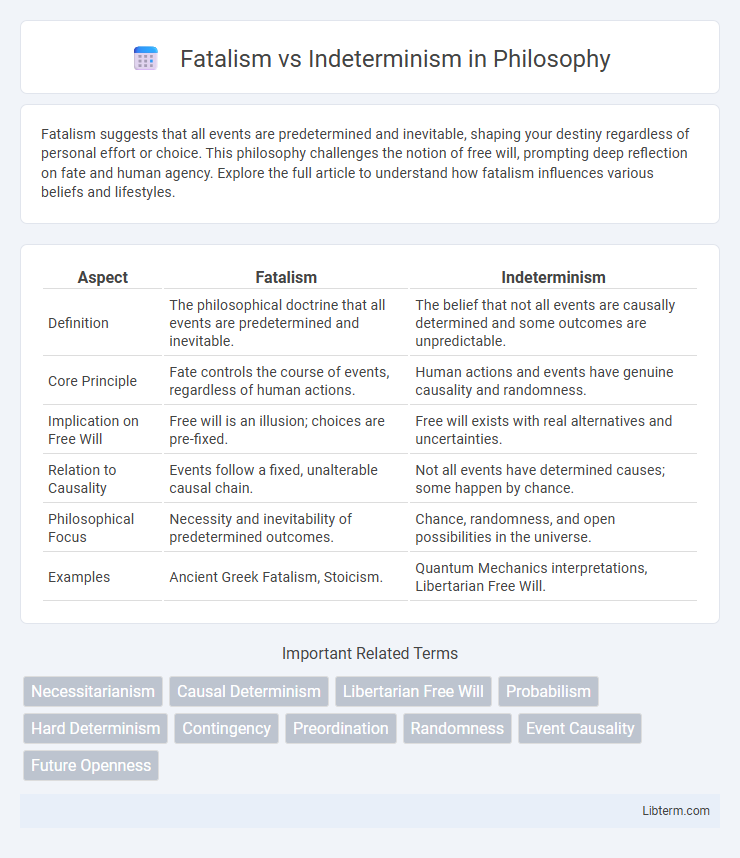Fatalism suggests that all events are predetermined and inevitable, shaping your destiny regardless of personal effort or choice. This philosophy challenges the notion of free will, prompting deep reflection on fate and human agency. Explore the full article to understand how fatalism influences various beliefs and lifestyles.
Table of Comparison
| Aspect | Fatalism | Indeterminism |
|---|---|---|
| Definition | The philosophical doctrine that all events are predetermined and inevitable. | The belief that not all events are causally determined and some outcomes are unpredictable. |
| Core Principle | Fate controls the course of events, regardless of human actions. | Human actions and events have genuine causality and randomness. |
| Implication on Free Will | Free will is an illusion; choices are pre-fixed. | Free will exists with real alternatives and uncertainties. |
| Relation to Causality | Events follow a fixed, unalterable causal chain. | Not all events have determined causes; some happen by chance. |
| Philosophical Focus | Necessity and inevitability of predetermined outcomes. | Chance, randomness, and open possibilities in the universe. |
| Examples | Ancient Greek Fatalism, Stoicism. | Quantum Mechanics interpretations, Libertarian Free Will. |
Understanding Fatalism: Core Concepts
Fatalism asserts that all events are predetermined and inevitable, emphasizing a fixed future that cannot be altered by human actions. This philosophical stance contrasts with indeterminism, which holds that not all events are causally determined, allowing for genuine randomness and human free will. Core concepts of fatalism include inevitability, predestination, and the denial of alternative possibilities in the unfolding of future events.
Defining Indeterminism: An Overview
Indeterminism asserts that not all events are predetermined, allowing for genuine unpredictability and free will in the universe. It challenges fatalism by positing that some occurrences result from chance or probabilistic processes rather than fixed causal chains. Quantum mechanics and theories of chaos provide scientific foundations supporting indeterminism's rejection of a predetermined fate.
Historical Roots of Fatalism and Indeterminism
Fatalism traces its historical roots to ancient Stoicism, which emphasized predetermined fate governing all events, while indeterminism finds its origins in early atomist philosophy and later Enlightenment thinkers who argued for chance and free will disrupting causal determinism. The Stoics believed in a rational cosmos where destiny is fixed, contrasting with Epicurean atomism, which introduced probabilistic elements allowing for spontaneity. This philosophical divide shaped debates on free will, causality, and moral responsibility throughout history.
Key Philosophers and Their Perspectives
Fatalism, championed by philosophers like Marcus Aurelius and the Stoics, asserts that all events are predetermined and inevitable, emphasizing acceptance of fate as central to human experience. Indeterminism, supported by philosophers such as William James and quantum theorists like Niels Bohr, argues that not all events are causally fixed, allowing for human free will and spontaneity in the universe. The debate hinges on the nature of causality, with fatalism rooted in strict determinism and indeterminism embracing randomness and potentiality.
Causality: Determinism, Fatalism, and Indeterminism
Fatalism posits that events are predetermined and inevitable, rendering human actions powerless to alter outcomes, whereas determinism argues that every event is causally linked to preceding events, allowing for predictability based on prior states. Indeterminism challenges causal necessity by asserting that not all events are caused or predictable, emphasizing randomness or probabilistic processes in nature. The core distinction lies in causality: determinism requires strict causal chains, fatalism denies causal influence from actions, and indeterminism introduces causal gaps or unpredictability in the sequence of events.
Human Agency in Fatalistic and Indeterministic Frameworks
Human agency in fatalistic frameworks is constrained by predetermined events, rendering choices seemingly inevitable and minimizing genuine autonomy. In contrast, indeterministic perspectives emphasize the openness of the future, allowing human decisions to influence outcomes and supporting the existence of free will. This distinction highlights how fatalism challenges the concept of moral responsibility, whereas indeterminism upholds it by preserving the capacity for meaningful action.
Science and Quantum Mechanics: Indeterminism in Nature
Quantum mechanics demonstrates indeterminism in nature through phenomena like wave function collapse and particle superposition, challenging classical deterministic views. Experiments such as the double-slit experiment reveal inherent probabilistic behavior at the subatomic level, indicating that certain outcomes cannot be predicted with certainty. This scientific evidence contrasts fatalism, suggesting that some events occur without predetermined causes, emphasizing the fundamental role of chance in natural processes.
Ethical Implications: Responsibility and Moral Choice
Fatalism, asserting predetermined outcomes, challenges the notion of free will and raises ethical concerns about personal responsibility in moral decisions. Indeterminism supports the existence of multiple possible futures, allowing individuals to make genuine moral choices and bear accountability for their actions. The ethical implications hinge on whether agents are seen as autonomous decision-makers or as bound by fate, affecting concepts of justice and moral praise or blame.
Criticisms and Misconceptions: Clarifying the Debate
Fatalism is often criticized for implying that all events are predetermined and inevitable, neglecting the role of human agency, while indeterminism challenges this by emphasizing the openness of future possibilities and the influence of chance. A common misconception conflates fatalism with determinism; however, determinism asserts causality in events, whereas fatalism suggests inevitability regardless of cause. Clarifying this debate requires understanding that fatalism dismisses causal influence on outcomes, whereas indeterminism embraces unpredictability and the impact of randomness in shaping events.
Real-World Applications: Fatalism vs Indeterminism Today
Fatalism influences decision-making in legal and ethical debates by suggesting predetermined outcomes regardless of human action, often challenging notions of moral responsibility. Indeterminism underpins advancements in quantum physics and artificial intelligence, emphasizing unpredictability and genuine choice within complex systems. In social policy, embracing indeterminism encourages adaptive, flexible strategies to address dynamic human behaviors and evolving societal needs.
Fatalism Infographic

 libterm.com
libterm.com